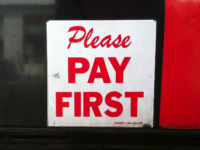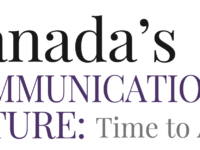My review of the Broadcast and Telecommunications Legislative Review Panel report (previous posts include an overview of concerns, news regulation, Guilbeault’s comments, net neutrality, discoverability claims, consumer costs, potential USMCA violations, and a podcast debate with panel chair Janet Yale) continues with an analysis of why the recommendations could cost Canadians millions of dollars in retaliatory tariffs. In fact, while the panel seemingly envisions free money with payments from thousands of Internet sites and services from around the world to pay for Canadian content, broadband funds, and news organizations, the reality is that the proposals could result in the U.S. being entitled to levy massive tariffs against Canadian products ranging from dairy products to steel. In other words, the real costs would ultimately shift to farmers, manufacturing workers, and many others with no connection to the cultural sector.
Archive for February, 2020
The BTLR and USMCA, Part One: Why the Broadcast Panel Recommendations Conflict With Canada’s Emerging Trade Obligations
Since the release of the Broadcast and Telecommunications Legislative Review Panel report late last month, I’ve posted on several key issues including an overview of concerns, news regulation, Canadian Heritage Minister Guilbeault’s comments, net neutrality, discoverability claims, consumer costs, and a podcast debate with panel chair Janet Yale. The blog now shifts for the next two days on trade-related concerns arising from the report’s recommendations. This issue is particularly timely since the House of Commons has been debating Bill C-4, the implementation bill for the US-Canada-Mexico (USMCA) Trade Agreement and the government had made treaty implementation one of its top legislative priorities.
Higher Costs and Less Choice: Why Consumers Will Pay the Price for the Broadcast Panel’s Plans to Increase Costs of Internet Services and Sites
In the months leading up to the release of the Broadcast and Telecommunications Legislative Review Panel report, there was considerable focus on whether it would recommend a “Netflix tax”, a catch-all term that has come to mean digital sales taxes, corporate taxes, and mandated contributions to support the production of Canadian content. The report contains a curious paragraph in its overview in which it claims that the panel is not recommending a Netflix tax. It states:
We want to be clear that we are not recommending that Canadian content be supported by the so-called ‘Netflix Tax’ – charging consumers an extra levy on subscriptions to such services as Netflix. It is more appropriate to establish a regime that requires such online streaming services that benefit from operating in Canada to invest in Canadian programming that they believe will attract and appeal to Canadians. This approach would ensure a meaningful contribution to Canadian cultural policy objectives and the production sector. It need not result in higher prices for consumers.
The reference to a Netflix tax in the overview is the only such reference in the 235 page report. It was likely included in the overview in the hope that media coverage would jump on the claim and seek to re-assure Canadians that there was no Netflix tax or higher prices likely for consumers as a result of the report’s recommendations.
Yet the reality for anyone that reads beyond the overview is that the panel’s report not only recommends what would widely be considered a Netflix tax but proposes perhaps the biggest Internet cash grab in the OECD with mandated payments and levies on thousands of Internet services with Canadian users.
The LawBytes Podcast, Episode 38: Debating the Broadcast Panel Report – A Conversation with BTLR Panel Chair Janet Yale
The release of the much-anticipated Broadcast and Telecommunications Legislative Review Panel report late last month sparked a torrent of discussion and debate. The 235 page report – often referred to as the BTLR or Yale Report – features 97 recommendations that covers telecom, broadcast, the future of the CBC, online harms, digital taxation, and a myriad of other issues. Janet Yale, the panel chair, joins the podcast this week to talk about the report. Our wide ranging conversation touches on the policy objectives of the panel, the news regulation concerns, net neutrality, consumer costs, and what may lie ahead for communications law reform.
The Broadcast Panel Report and Discoverability of Canadian Content: Searching for Evidence of a Problem
The Broadcast and Telecommunications Legislative Review Panel report places considerable emphasis on the need to support the “discoverability” of Canadian content. The term appears repeatedly in the report as discoverability of Canadian content is treated as an equivalent goal to creation and production. Given the panel’s view of its importance, it recommends that all media content undertakings (other than some news organizations) be subject to discoverability requirements:
The CRTC must also be able to impose discoverability measures on media content companies. Consumers now have access to an endless choice of content, making it difficult to find, or simply recognize, Canadian content. In fact, a majority of consumers have said that they have difficulty finding content they want to watch. Further, algorithms and AI-based processes have a major influence on program recommendations with a consequent influence on the discoverability of content.











